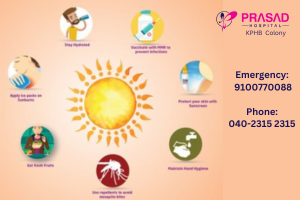Summer brings its own set of health challenges, with a variety of diseases becoming more prevalent due to the hot and humid weather conditions. Here are some common summer diseases and their remedies:
Heatstroke:
Heatstroke is a serious condition that occurs when the body overheats due to prolonged exposure to high temperatures. Symptoms include a high body temperature, rapid pulse, headache, dizziness, nausea, and confusion. To remedy heatstroke, it’s crucial to move the affected person to a cooler place immediately. Provide them with water to drink and use cool compresses or ice packs to lower their body temperature. Seek medical attention promptly as heatstroke can be life-threatening if not treated promptly.
Dehydration:
Dehydration occurs when the body loses more fluids than it takes in, often due to excessive sweating in hot weather. Symptoms include thirst, dry mouth, dark urine, fatigue, and dizziness. To remedy dehydration, encourage the affected person to drink plenty of fluids, preferably water or oral rehydration solutions. Avoid caffeinated or alcoholic beverages as they can worsen dehydration. In severe cases, intravenous fluids may be necessary, so seek medical help if symptoms persist.
Sunburn:
Sunburn is a common summer ailment caused by overexposure to ultraviolet (UV) rays from the sun. Symptoms include red, painful skin, blistering, swelling, and peeling. To remedy sunburn, cool the affected area with cold compresses or take a cool bath to soothe the skin. Apply aloe vera gel or moisturizing lotion to hydrate the skin and relieve discomfort. Avoid further sun exposure and wear protective clothing, hats, and sunscreen with a high SPF to prevent future sunburns.
Foodborne Illnesses:
With outdoor picnics, barbecues, and food festivals being popular during summer, the risk of foodborne illnesses increases. Bacteria like Salmonella and E. coli thrive in warm temperatures and can contaminate food, leading to food poisoning. To remedy foodborne illnesses, ensure proper food handling, storage, and preparation. Cook meats thoroughly, refrigerate perishable foods promptly, and avoid cross-contamination by using separate cutting boards and utensils for raw and cooked foods. If symptoms like nausea, vomiting, diarrhea, or fever occur after consuming contaminated food, seek medical attention.
Allergies and Respiratory Issues:
Summer allergies, triggered by pollen, dust, and mold spores, can exacerbate respiratory conditions like asthma and hay fever. To remedy allergies and respiratory issues, minimize exposure to allergens by keeping windows closed, using air purifiers, and avoiding outdoor activities during peak pollen times. Over-the-counter antihistamines and nasal sprays can provide relief from allergy symptoms, while asthma medications should be used as prescribed by a healthcare professional.
In addition to these remedies, it’s essential to stay hydrated, wear lightweight, breathable clothing, and seek shade during the hottest parts of the day to prevent summer-related illnesses. Taking proactive measures to protect oneself from the heat and common summer diseases can ensure a healthy and enjoyable season.

